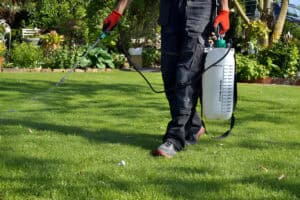Most local news outlets have already picked up the story: fall armyworms are back in Arkansas, leaving a visible trail across lawns and pastures around Little Rock. Livestock farmers and front lawn lovers alike are seeking quick ways to protect their grass from these voracious creatures, whether by themselves or with the help of one of many Little Rock lawn services.
Armyworms: What They Are and What They Mean to Your Lawn
The fall armyworm is the larval stage of the fall armyworm moth, and it owes its name to both their favorite season and mode of destruction. This species is fond of settling an area in large numbers and forming a veritable army of larvae that will eat entire pastures in a matter of days. After that, they cocoon themselves for several days, grow wings, fly to their next food source as soon as they become adult moths, and replicate the process.
Armyworms are considered a major agricultural pest. They will eat any grass or small grain crop, but they are particularly fond of Bermuda grass. Several farmers and Little Rock lawn care companies have described their effects as “poison” – entire fields can go brown, their height halved almost overnight.
If You Want to Protect Your Lawn, Early Spotting Is Key
According to the University of Arkansas Cooperative Extension Service, by the time you realize your lawn is damaged, it’s likely that the armyworm caterpillars are already hard at work. If your lawn is too large for you to thoroughly inspect, then pick ten one-foot square areas at random across the entire lawn and check two of them every couple of days as closely as possible.

Any sign of creamy white eggs or tiny green larvae under the leaves means it’s time to act fast. If the larvae haven’t hatched or if the caterpillars are still very small, an emergency call to a professional lawn services provider can halt these pests before the first wave of the invasion is visible.
If you find more than three caterpillars in an area or you find larvae that are already a half-inch long, your lawn should be treated for an infestation. Once they reach an inch-and-a-half, they are ready to become moths and will be gone soon – but it’s likely most of your grass will be gone, too. From late August to early October, any visit from a Little Rock lawn services provider should include a fall armyworm inspection.
What to Do Before, During, and After an Armyworm Invasion
The main way to fight armyworms is through insecticides and is best left to professionals. Moreover, as the adult moths breed so fast, any spraying should be extra meticulous. This means you will probably want an experienced lawn care company to take care of the hard work, protective suits and all.
If your grass has already turned brown, then it’s time to ensure the worms don’t come back. Some extra pampering for your grass will help repair the damage more quickly – either an extra round of fertilizer or an adjusted watering schedule will make a visible difference when it comes to turning the brown into lush greens once again.
If you need to protect your back yard from a hungry armyworm battalion or if you’re looking for the most efficient way efficient way to restore your Bermuda grass to full health, then it’s time to rely on Little Rock Lawn’s 17 years of experience. Contact us now for a free lawn consultation!





